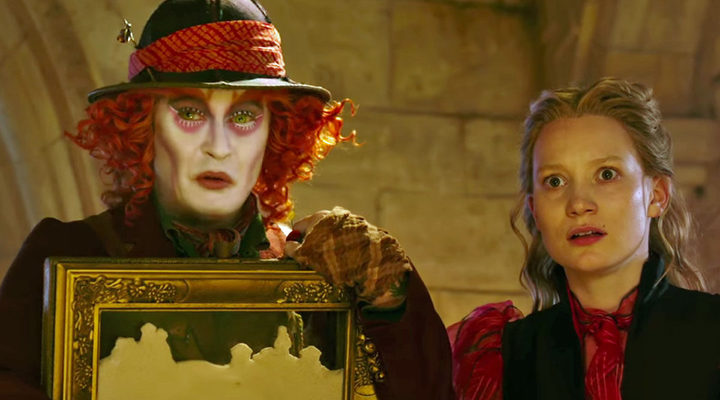
 2010's
Alice in Wonderland wasn't really a great film, but it
did rake in a hefty billion dollars from the worldwide box office, so,
naturally, that's going to green-light a sequel just about every time.
Six years is a long time to wait by Hollywood standards for a
follow-up to a movie that didn't build up cult status over the years
-- in fact, it's mostly forgotten by most -- so now that it's
here, most people, even those who were mildly entertained by the first
effort, are likely adopting a wait-and-see approach. After
seeing it, my advice: stop waiting, don't see it.
2010's
Alice in Wonderland wasn't really a great film, but it
did rake in a hefty billion dollars from the worldwide box office, so,
naturally, that's going to green-light a sequel just about every time.
Six years is a long time to wait by Hollywood standards for a
follow-up to a movie that didn't build up cult status over the years
-- in fact, it's mostly forgotten by most -- so now that it's
here, most people, even those who were mildly entertained by the first
effort, are likely adopting a wait-and-see approach. After
seeing it, my advice: stop waiting, don't see it.
Alice Through the Looking Glass continues the mostly CG look
into the realm of the beloved Lewis Carroll creations, only this time,
the adventure that they're on is entirely new for the screen, trying
to delve into the backstory of a few of the more notably eccentric
characters, namely, the Mad Hatter (Depp,
Black Mass), the Red Queen (Carter,
Cinderella), and the White
Queen (Hathaway, The Intern). The director of the previous film, Tim Burton, vacates
the director's chair to concentrate on producer duties, allowing
The Muppets director James Bobin to try to make sense of this
convoluted script from longtime Disney screenwriter Linda Woolverton (Maleficent,
The Lion King),
who also wrote the 2010 release. The awfulness of Through
the Looking Glass shouldn't be blamed on Bobin, however, as he's
handcuffed by having to firmly adhere to the bizarre style and
grotesque aesthetic of the original film, while also answerable to the
film's original director throughout, which means that the vision of
the movie is mostly out of his hands.
The story picks up as Alice (Wasikowska,
Crimson Peak) has come home to London for a spell after
traveling the world as the captain of her own ship. However, she comes
to find that her ex, Hamish (Bill, Mr.
Turner), is using financial leverage that
pressures her to stop adventuring by handing over the ship and taking
up a job as a clerk at his shipping company in order to pay for the
family home that Alice's mother (Duncan,
Birdman) had signed over to him. Unable to deal
with the stress at hand, Alice finds a portal in the large mirror
above her fireplace which returns her to Underland, where she's
immediately greeted by her fantasy friends. It's not all a happy
reunion, as she soon discovers that the Mad Hatter has taken ill,
learning that his thought-deceased family may still be alive, but he's
unable to locate them. To save her friend, Alice visits the
realm where Time, in human form (played by Sacha Baron Cohen (The
Brothers Grimsby) in a
German accent that channels Werner Herzog if he were trying to do an
impression of Christoph Waltz), has a free-floating vehicle called the
Chronosphere, which will allow Alice to go back in time to make things
right for Hatter and his kin. Along the way, she also discovers
more information about the dreaded Red Queen's early years, who, once
again, stands in the way of Alice's success.
The only thing that's really going for Alice Through the Looking
Glass is its emphasis on eye-popping visuals. While I find
nearly every one of the character designs to be unappealing or
repugnant, there's no question that the makers of the film put a great
deal of time and effort into the incredible costume designs and the
eerie beauty of the Underland environs. Alas, it would have been
nice to see these digital creations used more sparingly, as the film
covers just about everything, from entire landscapes to the make-up on
Johnny Depp's face, with the same kind of computer-generated coating
that never truly allows us to feel like we're really being taken away
to a place that Alice would take as real. That would still be
fine if the so-called real-world scenes of Alice captaining a ship
weren't also filled to the brim with computer effects just as obvious
as those in Underland.
One of the major reasons why Alice through the Looking Glass
fails to captivate is its insipid story, which requires us to learn
more about a character that we neither care about nor relate to getting
back together with his missing family. There's also a
ridiculously silly subplot involving the origin of the Red Queen's
madness, involving, of all things, who left tart crumbs on the floor
under her bed (you read that right). As with more recent fairy
tale efforts, from "Wicked" to Maleficent, there's an attempt
here for us to sympathize with the main enemy as someone who is not
evil, merely misunderstood and damaged to the point where she has no
choice but to play the heavy. If anything, the acts committed
because she can't get over misplaced blame for something nearly
inconsequential makes the Red Queen seem even worse than if her heart
were filled with pure malevolence from birth.
This brings up another problem, which is that of character
irrelevancy. We end up never really caring about Alice as a
person, seeing here merely as a vessel through which we meet a
menagerie of odd people doing one or two absurd things to distinguish
them. Characters this thin don't deserve back stories to explain
them, or extended climaxes that have no real consequences to us
because we never believe there are any real stakes at hand for
characters we don't have much vested interest in, or for a fantastical
and magical world where anything can and does happen, and we're not
even sure really exists outside of Alice's imagination.
Whereas Lewis Carroll's work succeeded mostly because it didn't
explain every single thing about it, offering a surreal experience for
young and old alike who read it as a straightforward fantasy, rather
than a political allegory. There's no satirical allegory here,
and not a great deal is left up to the imagination, trying to offer up
explanations for things that are better off just being characters
borne of inspired lunacy. Besides, trying to bring logic to the
realm of Underland only raises more substantive questions about its
existence that the film hasn't the time nor inclination to elucidate,
regardless of the origin stories of a few of its zanier residents.
In the film, the Chronosphere is not to change the past but to make
things better in the present. If only the makers of Alice Through
the Looking Glass had learned this valuable lesson on their own
when they looked to the past for a billion-dollar property to exploit,
learning the worst lessons from why they think it was successful,
making their present production even more incomprehensible and
entirely superfluous than the original.
Qwipster's rating
:







©2016 Vince Leo

 2010's
2010's